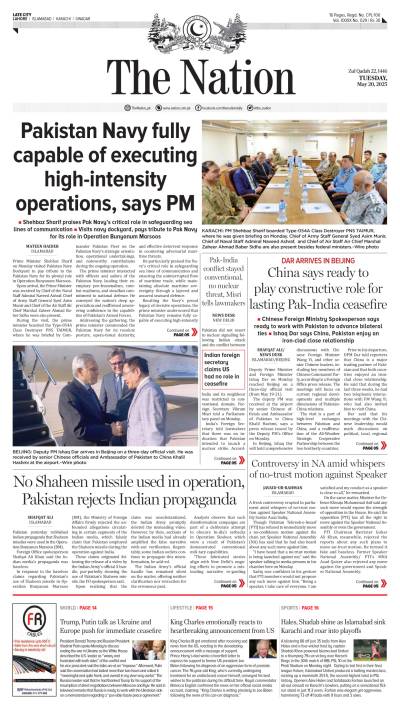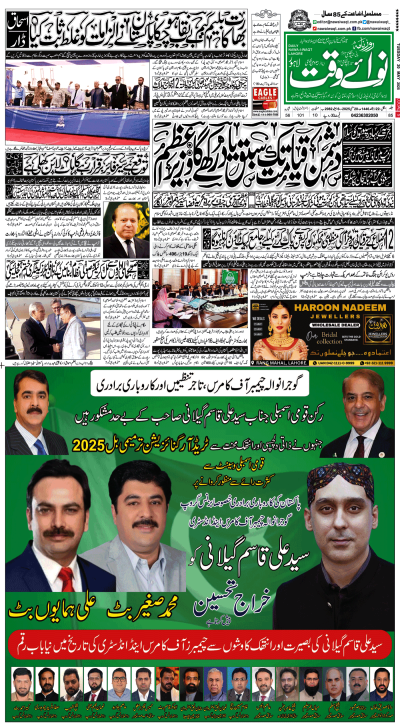Carl Von Clausewitz, a 19th century German theorist, defined the Centre of Gravity (COG) in his book, Vom Kriege, as “the representation of the source of an opponent’s power and strength and, therefore, the point against which all our energies should be directed”. In the United States, it is the source of power that provides moral or physical strength, freedom of action or the will to act. The national interest of Pakistan is independence, territorial integrity, national security, strong defence, Kashmir and economic prosperity. As such, its centre of gravity is its ideology and the Pakistan Army. Pakistan is an ideological state because it was founded on principles of Islam and it is this ideology which is fundamental to its continued existence.
Since 1947 Pakistan has been facing Indian threats as the two countries have fought four wars and there are continued border clashes along the Line of Control (LOC) and Working Boundary (WB). India has yet to accept the existence of Pakistan as a sovereign country. It even tried to prevent its emergence and then, in 1971, severed the country in two. India’s primary objective in the region has been to become a super power and the only viable challenge to its dominant position is the Pakistan Army. It has kept the national fabric from being torn apart and is the only institution towards which the nation looks during all natural calamities. An American political analyst, Christine Fair, wrote “For Pakistan to collapse, it is basically the Pakistan Army which has to collapse. For better or worse, I do not see that happening”.
Chanakya Kautilya in his book, written in the 4th century, advocated for covert operations and according to him, “a single assassin can achieve with weapons, fire or poison more than a fully mobilised army”. This is the core belief of the RAW operations against Pakistan. The focus of ‘The New Arthashastra, A security strategy for India’, a book edited by Gurmeet Kanwal, is the Pakistan Army, China and the growing Pakistan-China collusion. Today Pakistan and its armed forces are confronted with two types of warfare, 5th generation and hybrid. 5th generation is a non-contact style of warfare whereas hybrid warfare is a military strategy that employs political, conventional, irregular and cyber warfare to destabilise a country.
In 1971 Pakistan was the target of hybrid war when India propagated and used the narratives of the Bengali genocide, refugees in West Bengal as well as the training and arming of Mukti Bahini. Today, the target of hybrid war, besides the Pakistan Army, is Balochistan, Gilgit-Baltistan and the China-Pakistan Economic Corridor (CPEC) through the sponsorship of the Balochistan Liberation Army (BLA), Balochistan Republican Army (BRA) and terrorist groups operating from Afghanistan. Baloch insurgent leaders are frequently seen visiting India to get orders from their masters for future courses of action. The capture of Kulbhushan Jadhav from Balochistan shows India’s deep involvement in the province. CPEC’s development will not suit India, and the west, because they will lose their importance, power and status. It is because of this reason that the main target is the Pakistan Army, a body working to ensure the successful implementation of the CPEC project from Khunjerab to Gwadar.
Foreign powers are convinced that they cannot harm Pakistan as long as its armed forces are intact. They hold the view that unless the masses do not stand against the army, nothing can be achieved. This is what Indian retired security officials recommended during a talk show; they used Pakistani media to instigate the masses against the army by spreading fake news, scandals and misinformation. India and other hostile intelligence agencies are using social media to spread anti-Pakistan, anti-Pakistan Army narratives through paid accounts and pawns. The armed forces of Pakistan are a target of anti-state bodies who, on behalf of their masters, are writing false stories and promoting fake news to provoke the masses. In support of their mission to malign the army, thousands of fake profiles with Baloch, Pashtun and GB surnames have been created. Paid bloggers are being used to spew venom against the army.
Citizens should not engage in any activity that would cause damage to the prestige and reputation of the Pakistan Army. Ridiculing it and its officers in the name of freedom of speech is not acceptable. It was the Pakistan Army which succeeded in neutralising terrorists in FATA, Swat and Balochistan. It is because of their sacrifices that today, Pakistan is a peaceful and stable country. The army is fully aware of the conspiracies which are being hatched against it and are fully prepared to foil the nefarious designs of the enemy. As Pakistanis, we must also follow the phrase coined by American veterans “if you love your freedom, thank a veteran” and also those serving. The Pakistan Army is a professional and binding force.
Masud Ahmad Khan
The writer is a retired brigadier and freelance columnist.





